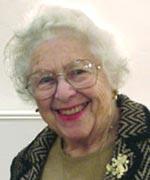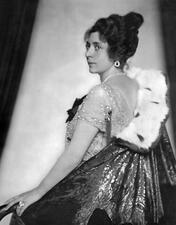
Fritzi Massary
Fritzi Massary was a prominent singer in Berlin prior to the onset of World War II. She reigned over the Berlin stage, singing the title role in Franz Lehar’s The Merry Widow and Adele in Johann Strauss’s Die Fledermaus. Among the works created especially for her was the operetta Die Kaiserin by Leo Fall.
Etta Wedell Mastbaum
Etta Wedell Mastbaum was the scion of a prominent nineteenth- and twentieth-century Philadelphia family. A philanthropist, department store executive, art collector, and director of a national chain of motion picture theaters, Mastbaum donated a collection of Rodin sculptures and ephemera to the city of Philadelphia.

Ronit Matalon
Ronit Matalon was an Israeli writer of Egyptian heritage who wrote and published in Hebrew. She was the author of numerous works of fiction and essays and worked for many years as a journalist. Her work touches on Mizrahi identity, family, gender, and politics, and incorporates visual elements as well as cultural criticism.
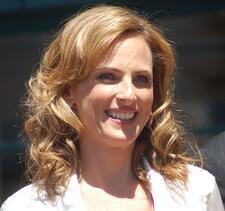
Marlee Matlin
Marlee Matlin’s Oscar-winning film debut in 1986’s Children of a Lesser God made history on multiple fronts. At 21, not only was Matlin the youngest-ever Best Actress winner, she was also the first Deaf actress to be recognized by the Academy. Her subsequent career in film and television, as an author, and as an activist for the Deaf community, has paved the way for inclusive, nuanced storytelling that showcases Deaf culture to hearing audiences.
Matriarchs: A Liturgical and Theological Category
Pearl Bernstein Max
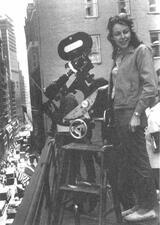
Elaine May
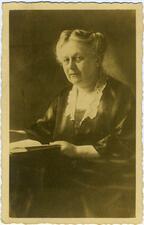
Henriette May
Henriette May was committed to the upbringing of children and care for needy adults. She was active as a board member and editor for Jewish newspaper Jüdischer Frauenbund starting in 1907, established a home for Jewish women teachers in Berlin, and was a prominent member of numerous welfare institutions.
Irma May
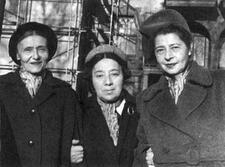
Ida Maze
Ida Maze was a “communitarian-proletarian” Yiddish writer who turned her Montreal home into a magnet for Yiddish writers and culture. After emigrating from Belarus to North America at age twelve in 1905, Maze began writing lyrical poems that were original and inspiring to young people.
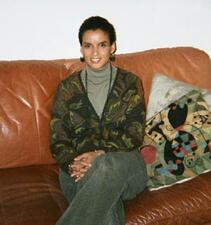
Susan Maze-Rothstein
Ellen Lehman Mccluskey
Ellen Lehman McCluskey, a firm believer that quality design is a result of close communication between architect and interior designer, built her own design firm into a business with national, international, and professional respect.
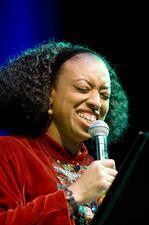
Yavilah McCoy
Portrayals of Women in Israeli Media
Medieval Ashkenaz (1096-1348)
The Jews of medieval Ashkenaz are known for their prolific rabbis and for the Ashkenazic customs that became characteristic of many European Jewish communities. During the High Middle Ages, the women in these communities had many important roles women within the family and in the communal, economic, and religious life.
Medieval Hebrew Literature: Portrayal of Women
Stereotypes of women, “good” and “bad,” are found throughout the medieval Hebrew canon. The love poetry cultivated during the Golden Age in Muslim Spain seems to glorify and idealize women, but the female “beloved” is subject to the power of the male “gaze” and male rhetoric.

Leandra Medine
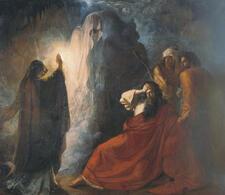
Medium of Endor: Bible
The story of Saul’s visit to the medium at Endor suggests that various types of divination were well established in Israel. Notably, the story does not imply that the medium’s identity as a woman is significant, illustrating that being a medium was a chance for women to have a professional role in ancient Israel.
Martha Tamara Schuch Mednick
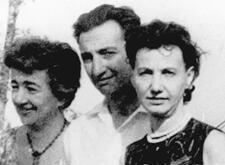
Vladka Meed
Vladka Meed was an underground courier who smuggled weapons to the Jewish Fighting Organization inside the Warsaw Ghetto while passing as a Christian outside its walls. In 1948 she published a memoir about her experiences, On Both Sides of the Wall. Meed received many awards for her work in Holocaust education and memorialization.
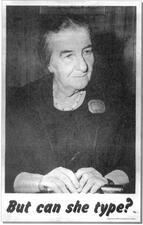
Golda Meir
A direct, no-nonsense politician who participated in Israel’s governance from its independence onward, Golda Meir served as Israel’s first female Prime Minister through the turbulent period of the Yom Kippur War.
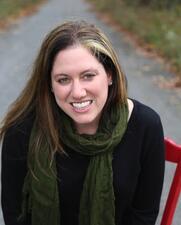
Erika Meitner
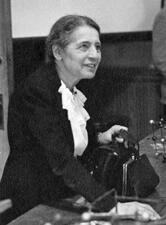
Lise Meitner
Lise Meitner’s influential work concerning radioactivity in the early 20th century made her a target of the Nazis. She fled to Sweden in 1938, and it was there that she discovered the power of the fission reaction. Even though Meitner never worked on nuclear weapons, her 1939 research was essential in the research of nuclear power.
Deborah Marcus Melamed
Deborah Marcus Melamed encouraged Jewish women to form their own relationship with Jewish practice through her 1927 book The Three Pillars, an interpretive guide to rituals and customs. Melamed also served as vice president of the Women’s League for Conservative Judaism from 1920 to 1930 or 1932.
